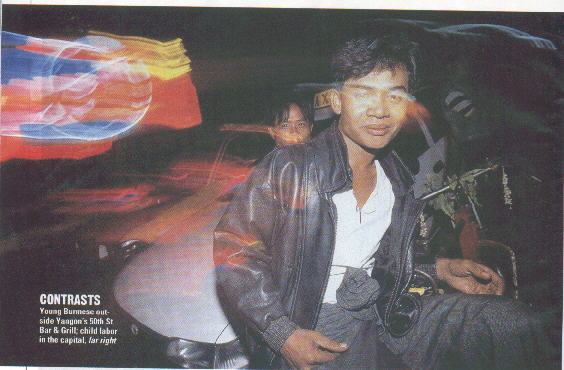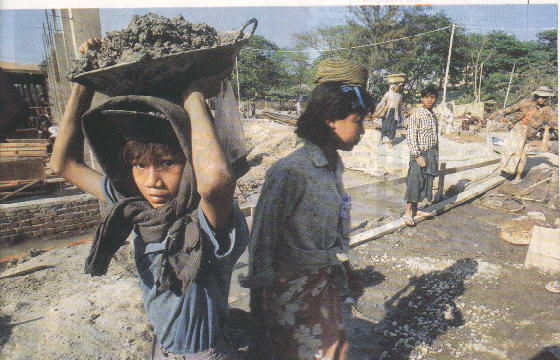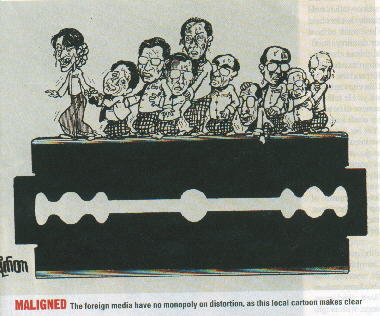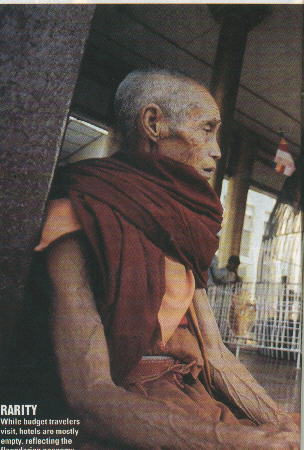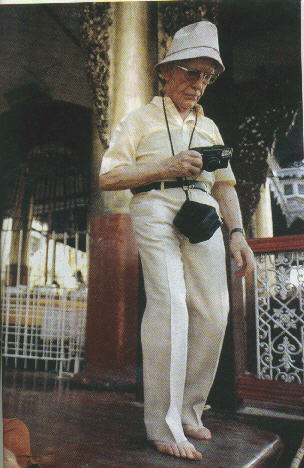Kyaiktiyo, 160 km southeast of Yangon. Despite
the bfl colic setting deep in the hills, the settlement
bustles with people well after 8 p.m.
OF NEW BRIDGES AND CLOSED CAMPUSES
I have also heard that there are travel restrictions
for
journalists. I soon discover that this is another
canard. When I tell the regime's main spokesman
Col. Hla Mim that I plan to travel outside of Yang-
on, he says: Go where you want. If you need a
visa extension, let me know."
I decide to hire a car and driver and visit the
former capital Mawlamyine, a small port city 120
km south of Kyaiktiyo. We leave at 6 a.m., quick-
ly clearing the almost empty streets (Yangon is a
slow-starting city). The journey takes seven hours,
and we do it with only one short break. The road
is fine as far as Bago, then it deteriorates a little,
then improves again - although remaining nar-
row. I see no other Caucasians during the whole of
this trip, so I am bemused when, halfway to Maw-
lamyine, we pass a large sign in Burmese and
English that says: Please give all assistance to
international travelers."
But it is surprise rather than bemusement that
I
feel when, in the final stretch, we pass over a cou-
ple of new suspension bridges, obviating the need
to take the old car ferry at Mottarna. Painted a pas-
tel orange shade, they are long and sleek, and again
beg the question: How do they do this? Forced
labor'? Surely not for such skilled engineering
work? Certainly, the regime denies it; although
Burmese exiles claim it continues. All I can say is
that on my travels, the various road crews I see are
invariably military men not civilians. On the drive,
we pass squads of uniformed conscripts doing
maintenance work and clearing the verges.
As for Mawlamyine itself, I suspect Kipling
would find it little changed. They still smoke
whacking white cheroots and the temple bells still
call. Down in the sidestreets around the jettys,
however. it is not so nice. There is an overpower
mg air of desolation and squalor, only marginally
mitigated by the silent dignity of the people. Yet
the bounty of produce in their market is astonish-
mg: meat, fish, rice, fruit, vegetables and wonderful
arrays of
fresh flowers. People buy big bunches of them! It is
hard not to
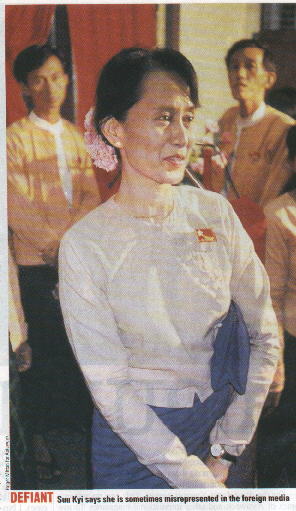
feel optimistic surrounded by flowers. But before I get too in-
toxicated. I decide to visit the local university.
Perhaps the most telling thing about Myanmar is that the
campuses remain closed. Even Foreign Minister Win Aung
looks sad when he talks about this. And frankly it is an area
where the regime has been less than honest. Last year, I was as-
sured that the universities would reopen soon. some depart-
ments have, but by and large most are still do not. The cam-
pus of Mawlamyine University, a relatively new building, is in
utter neglect. Lecture rooms are untouched since they were pad-
locked three years ago. Moldering papers and specimen jars
gather dust in musty rooms. The quadrangles are littered with
the ashes of open fires and dog exereta. The regime can talk all
it likes about securing ceasefires with rebellious minorities, but
if it can't risk opening the universities to allow its youth to get
an education then there is no real stability.
NE WIN'S GUN-PACKING GRANDSON
One evening in Yangon, I unwittingly refute the assertion
that
the military police check residences for unauthorized
guests
